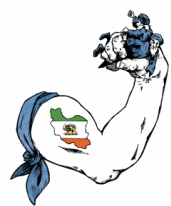Friday, 30 June 2006
Now THESE Are Protests
Nearly 500 anti-government protests in Iran in past month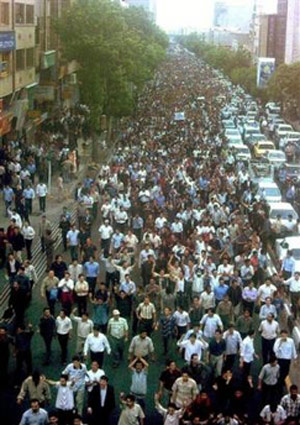
Iran Focus
London, Jun. 28 – There have been some
480 anti-government protests in Iran since in the Iranian calendar month ending June 21,according to a tally provided to Iran Focus by Iranian dissidents.
Students were the most politically active group in the past month, having organised at least 136 demonstrations, sit-ins, gatherings, and strikes.
Workers took part in some 60 protests.
Among the month’s major protests was a
100,000-strong anti-government rally by ethnic Azeris in the city of Tabriz against the publication of an insulting cartoon in the official daily Iran.
Subsequently,
thousands took part in often violent anti-government demonstrations in the towns of Orumieh, Zanjan, Marand, Naqadeh and Ardebil. At least nine people were killed by government forces in the course of clashes with the protestors.
Several hundred people were arrested during a major demonstration by Iranian women on June 12.
There were also several demonstrations by students in four of Tehran’s universities.
Dissidents accuse the government of imposing an atmosphere of repression in Iran in order to terrorise citizens and dissuade them from taking part in protests.
At least five women and two 18-year-olds were executed in Iran in the past month alone.
Now just compare that with my previous post about the Seething Arab and Turkish Street.
Not much to compare is it.
Oh and have you heard anything about the protests in Iran?
At all?
Technorati Tags:
Iran |
Streets of Seething ??
Hat Tip
LGF The Arab Street is raging.
CAIRO, Egypt - Several thousand protesters at one of Cairo’s main mosques called Friday for holy war against Israel to help the Palestinians in their conflict with the Jewish state.
More than 3,000 people packed Al-Azhar Mosque, the most prominent institution in the Sunni Arab world, for prayers and a demonstration organized by the Egyptian government’s top rival, the Muslim Brotherhood.
“Rulers of Arab countries, start holy war! God is great!” men shouted, their voices ringing through the rafters of the 1,000-year-old building.
Cairo has a population of 16 MILLIONAnd so is the Turkish Street.
ISTANBUL, Turkey - Thousands of angry Turks burned an Israeli flag Friday and chanted “Murderer Israel, Get out of Palestine!” to protest Israel’s offensive into the Gaza Strip.
Hundreds of women, wearing black chadors or covering their heads with Islamic-style head scarves, carried Palestinian flags and banners which read: “Israel is burning Palestine.”
Police said about 5,000 people participated in the protest outside Istanbul’s Bayazid Mosque.
Istanbul has a population of 11.3 MILLIONCan someone tell me what's wrong with this picture and WHERE
the phrase "Strets are seething" comes from?
Because to me it looks more like the Arab and Turkish Streets yawned.
To compare it with the City I live in, if there were a demonstration in front of City Hall of about 50 people, I don't think the local paper would headline a story, "City Streets Seething".
Besides in that part of the world, how much would it cost to throw up a 3 to 5 thousand person demonstration anyway?
Do these events sound like an outpouring of popular condemnation?
|
Wednesday, 28 June 2006
The Elephant That Cried
by Dr. Chordate The herd of elephants walked lazily about the jungle enjoying a fine, warm day. After an excellent lunch of bananas, they all lay down on some soft grass to take naps.
All except one young elephant that did not feel tired enough to sleep. Since he had no one to play with‹all the other young elephants were asleep‹he just wandered around for awhile smelling the flowers, looking into hollow trees, and chasing butterflies. And getting bored.
The young elephant sat down to try to think of something more exciting to do. Suddenly, he had a splendid idea! He would play a funny trick on all the other elephants and get a good laugh.
Quietly, he crept back to where the elephants lay sleeping. Then, in his loudest voice, he cried,
?Mouse! Mouse!?
All of the other elephants awoke from their sleep, and with rather amazing speed and agility, jumped high into the snake-infested banana trees where they clung to the branches with all their might. For nothing‹absolutely nothing‹terrifies an elephant like a mouse.
The young elephant laughed and laughed until he thought his belly would split open. He rolled on the ground holding his sides and gasping for breath.
When the other elephants finally saw that the young elephant had tricked them‹for there was no mouse‹they climbed down from the banana trees. Since elephants are rather friendly creatures, they soon forgave the young elephant. They they decided to go down to the river for a drink of water.
The young elephant followed them, congratulating himself on his clever trick. So proud of himself he was that he began to look for another chance to play the same trick.
When all the other elephants had lined up on the bank of the river drinking water, the young elephant came up behind them, and, in his loudest voice, he cried,
?Mouse! Mouse!?
Without thinking, all of the elephants jumped into the crocodile-infested river, crouching down low in the water so that only the tips of their trunks showed and they could still breathe. For nothing‹absolutely nothing‹terrifies an elephant like a mouse.
The young elephant laughed and laughed until he thought his belly would split open. He rolled on the ground holding his sides and gasping for breath.
At last the other elephants stuck their heads out of the water and saw that the young elephant had tricked them again. For there was no mouse. They blew the water out of their trunks and climbed out of the river. And since elephants are rather friendly and good-natured creatures, they soon forgave the young elephant. Then they decided to go back into the jungle to look for more bananas to eat.
The young elephant followed them. He had never had so much fun in his life, and he looked for another chance to play the same trick.
Suddenly, the young elephant heard a noise behind him. When he turned to look at what made the noise, what did he see?
A real mouse!
The young elephant ran to catch up with the others.
?Mouse! Mouse!?
he cried in his loudest voice.
?Mouse! Mouse!?
But this time the other elephants did not jump and they did not run. ?He is just trying to trick us again,? they said among themselves. ?But we will not fall for that trick this time.?
?No, it is a real mouse!?
cried the young elephant.
?It really is a mouse this time!?
But the other elephants did not believe him. They just went on eating their bananas until . . .
more
So what is the real story behind this tale?
I ran across it while mulling over the Hysteria of the Muslim world about their oft repeated World Zionist plot. It seemed to me more like an elephant afraid of a mouse.
There are 1.4 Billion Muslims in the world and 13.3 MILLION Jews?
What's wrong with this picture?
But Dan, you may say, look what is happening in Gaza as we speak. The State of Israel is demolishing the Palestinian State.
There are two words here that count, State. Israel withdrew from Gaza, a Palestinian State was formed and it committed deliberate Acts of War against Israel, and there are consequences for such actions.
Yes it might appear that Israel vastly out powers the Palestinians. But aren't we forgetting Syria who helped the Palestinians, seize, dismember and occupy Lebanon for so many years?
We are also forgetting Iraq's former support and aid for terrorism.
We are forgetting Iran's present support with arms, explosives, etc.
The surrounding Arab Nations have used the Palestinians for over 50 years to rally their own people against a common enemy Israel and divert them from the injustices that they themselves live under.
See the terrified elephant cowering on a stool while the mice runs around and around it.
Some people use the phrase "paper tiger" as an aspersion of disdain, They are not even "paper elephants."

Technorati Tags:
Gaza:
Israel|
OPERATION USO CARE PACKAGE
This just hit my inbox. Give it some consideration.

OPERATION USO
CARE PACKAGE;
NEWSLETTER
Volume 3, Issue 1, January-June 2006
This Independence Day, help support those who protect our freedom. Sponsor a USO Care Package for a service member deployed overseas!
USO Sends 800,000th Care Package to Troops Serving Overseas!
The USO is proud to announce the delivery of the 800,000th USO Care Package, sent overseas in April. Operation USO Care Package continues to thrive thanks to the generous support of corporations, organizations, and the American public. Thousands of USO Care Packages are assembled and delivered every month to our brave men and women serving our country overseas.
The USO would like to extend a special thanks to the following corporate sponsors who have donated products, services, and their time to Operation USO Care Package.
AIM Healthcare Services Inc., AVON, AT&T, BAE Systems North America, Inc., Brown Printing Company, Celestial Seasonings, Columbia River Records, Hollywood Video, LJB Piper, LLC, Reader's Digest, Trail's End, Underwater Kinetics, The USAF Band, Vision IV (Sun Spots), Viking Athletic Booster, WM Wrigley Jr. Co.
Stuffing Party Snippets
Special thanks to individuals from Citibank, Lockheed Martin, Boeing, Northrop Grumman, Cisco Systems, Countrywide Financial, and Marriott as well as Mickey Jones, Sherri Saum, James Avery, Brian Littrell, and Leann Tweeden for volunteering at stuffing parties from January through May of 2006. Operation USO Care Package would not be what it is without your support!
Below, over 100 volunteers from Citibank gathered in Dallas, Texas to stuff
more than 5,200 USO Care Packages in February.

Below, Representative Kay Granger (R-TX) joins 100 USO volunteers to stuff almost
2,500 USO Care Packages at a stuffing party on Capitol Hill in March. In addition to
Congressmen and Senators, celebrity guests at this stuffing party included Sherri
Saum, James Avery, Brian Littrell, and Leann Tweeden.

Thanks from the Troops
Operation USO Care Package received the following emails from troops serving overseas...
"My troops and I just received a box of USO Care Packages two days ago
and it's really nice to see support from the states. It's tough over here,
but we really enjoy mail (especially goody bags) from the states. Our
packages had a card saying our packages were sponsored by the 'Big
Show' and I thought, 'Man, those guys are awesome.'"
--379 Expeditionary Communications Squadron
"I have just returned from my R&R leave and I want to "Thank You" for the
superb support your organization gives to us troops. Your smiling faces,
warm greetings, fresh refreshments, and care packages are without a doubt
a genuine sign of the sacrifices your volunteers give to keep the USO in
an active state."
--HHC SUST BDE, 101ST ABN

"Thanks to the USO for the supply care package. As you can see from
the enclosed picture everything comes in handy. We are deployed to Al Dhafra Air Base
in the United Arab Emirates. We are all USAF personnel from the 380th Air
Expeditionary Wing base Fire Dept."
Special Thanks to our 4 Star Sponsors!









Operation USO Care Package
PO BOX 8069
Topeka, Kansas 66608
1-877-USO-GIVE

|
Tuesday, 27 June 2006
They Really Are Clowns
When I read Michelle Malkin's
A BUNCH OF ANTI-WAR CLOWNS, the sign in one of the photos cracked me up!

Why? Because Pruning hooks are one of the first historical examples of dual use military/civilian technology?
They are Saxon WAR AXES!
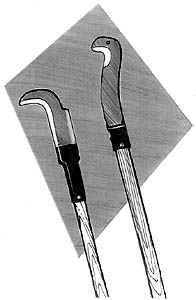
Pruning Hooks

War Axe
To tell you the truth, I would much rather go into battle with a pruning hook, than a spear any day.
Yes, let us beat our spears into something that makes an even better weapon, and if we want to clear some Brush on the side they will work for that too.
|
Monday, 26 June 2006
The Open Trackback Alliance XXXII
For your listening pleasure while you browse
"Der er et yndigt land" (There Is A Lovely Land)
Words by: Adam Gottlob Oehlenschlager
Music by: Hans Ernst Kr?yer
Adopted: 1844
"Derer et yndigt land" was first performed for a large gathering of Danes in 1844, and became popular quickly with the Danish people. It was adopted later that year by the Danish government as a national anthem, but not the sole national anthem. This anthem is on equal status with "Kong Christian",which is both the national and royal anthem.
When the Danish anthem is usually performed or sung, the first verse is played in its entirety, then it is followed by the last four lines of the last verse. (This is true whether the lyrics are sung or not
Recentlty I have been posting music to Illustrate the Diversity of America, this week I have a different motive to express Solidarity with DENMARK I maintain my Support of Denmark, and will later today, post links to and my thoughts about a Danish Editorial "We are being pissed upon by Per Nyholm "
I think I shall title my Post, "There is no "But" in "Freedom of Speech".
When I first started upon my journey through the blogverse I created a
Statement of PurposeNow upon reading it, one can realize that I did not hold to every detail of that original statement, but from it's basic premise, I have never swayed, in my belief that the Blogs are in fact the Committees of Correspondence of the Second American Revolution.
And that it is a Revolution of Information, no longer can we afford and allow elite gateways to control what we can see, hear and discuss.
For I believe that those bloggers who find their way, here and in particular from the Blogs associated with Sam.
HAVE SOMETHING TO SAY.
Some of us are more Serious, some of us are more lighthearted and some post the common ordinary things that make one smile and recall that Life without the simple things to treasure is meaningless.
And it is important that all have a platform from which to speak.
As I understand this process you can link to this post and trackback to this post on ANY subject or post you think important. It is open. I will repeat this every Monday.
The Committees of Correspondence welcomes your intelligent comments. And also welcomes you to join the
OPEN TRACKBACK ALLIANCEThis week I also have shortened my usual introduction for a more inportant message.

In it's struggle for Freedom of Speech.
Sign the Petition NOW!
JEG opstille hos Danmark!44545 Total Signatures 1:12 AM CST 22 June 26, 2006 We can do better pass the word~!
From Agora a call to
Support the Manifesto online by signing another Petition, why not sign both?
MANIFESTO: Together facing the new totalitarianism
Created by Mark Jefferson on March 1st, 2006 at 5:42 pm AST
After having overcome fascism, Nazism, and Stalinism, the world now faces a new totalitarian global threat: Islamism.
We, writers, journalists, intellectuals, call for resistance to religious totalitarianism and for the promotion of freedom, equal opportunity and secular values for all. "
Blogs that Trackback to this Post:
On Monday
In principio fu il cuneo fiscale. Oggi invece la priorita' e' piu' canne per tutti! from Camelot Destra Ideale
Jeffrey Kaelin of Winterport Summoned for OUI from Tor's Rants
More On Saddam's WMD's from 123beta
Sheehan Announces Hunger Strike, Michael Moore Strangely Silent from AbbaGav
Y'al come back now, Y'heah? ;-)
Technorati Tags:Denmark:Danmark
|
Friday, 23 June 2006
Japan To Conquer China by 2024
When I first ran across this CBS News Story, I will admit I was confused.
Hat Tip
LGF
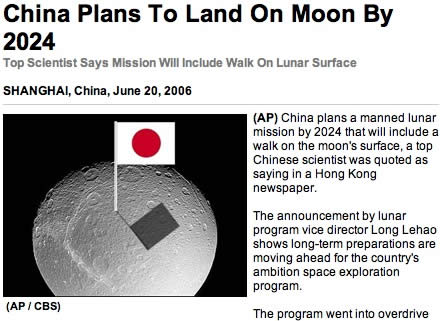
It is true that only an expert might notice that this photo is
not the Moon which orbits the Earth but one of the moon's of Saturn (Dione), that's not a big deal but one does wonder why they didn't use a stock photo of the right moon.
The fact that the shadow is in the wrong position is sloppy, but not a big deal either.
But the Flag itself?
Now that is incomprehensible.
An article whose title is China Plans To Land On Moon By 2024 and they used a JAPANESE Flag?
CBS used to be a professional newscaster. How Times have changed.
And that bothered me. Had Times changed so much that one of the Premier News Agencies in the World could no longer be trusted?
Or was there something I was overlooking??
I pondered their vast and Professional Editorial Staff, their extensive Research Capabilities, their Legion of experienced Journalists and realized
NO this could not be a mistake, it could not be the result of Institutional Incompetence it must be instead one more example of the
Dan Rather Paradox of Validity.
Where all the Facts are False but the Underlying Truth is Correct.
So WHAT Underlying Truth could result in China being on the Moon by 2024 flying the flag of the Republic of Japan, rather than the People's Republic of China.
It was then I realized only ONE set of future events could result in the simultaneity of both facts.
If Japan CONQUERS and absorbs China before 2024!
Then the whole article makes sense. There are a lot more Chinese than Japanese the New Government might want to use Chinese Astronauts to start with until they get all the kinks worked out.
Linked to
Thema/Monday Open Post at third world county
Technorati Tags:
China:
Japan|
Wednesday, 21 June 2006
The Enhanced Political Quiz
...in 2D
To launch quiz2d, press here.
Non-Javascript Link
Take the Quiz Online Liberty or tyranny? Where do you stand?
Take the quiz and find out...precisely.
Link to quizand get statistics of people who travel the link from your site.
I can point them back to you afterwards.
StatisticsSee how other people scored.
Here are my results:
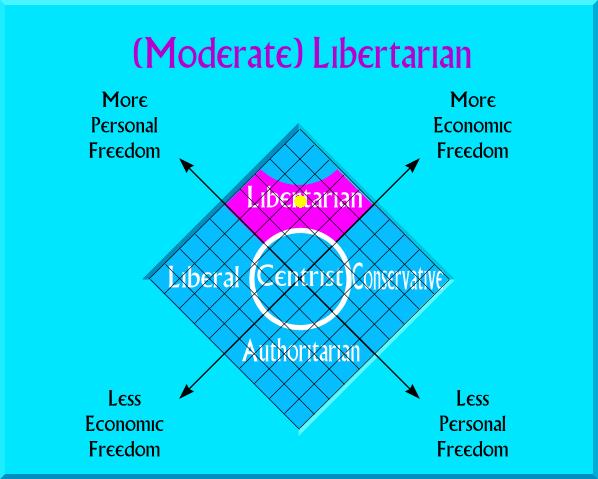
Technorati Tags:Libertarian
|
Tuesday, 20 June 2006
China: Crisis and Implications
By George FriedmanThe Chinese government is continuing efforts to cope with its
runaway economy. The People's Bank of China has raised interest rates. Banks have been told to
curb lending. The government has said that it will implement procedures to rein in foreign acquisitions at low prices -- or, in other words, to block fire-sales of Chinese companies. As a recent headline in the Japan Times put it, "China's Monetary Surge Dooms Its Boom."
A lot of things have gone into dooming China's boom, and the money surge is one of the more immediate problems. However, as we have argued (and this article should be read in the context of
past analyses), the end of the Chinese boom was inevitable. The issue now is how all of this will play out in China and in the world.
I have a previous post on my thoughts regarding the Chinese economic future at The Lusty Chinese Economy
What must be understood is that China now is moving from an economic problem to a
socio-political one. The financial problem is a symptom; the fundamental problem is that tremendous irrationality has been built into the Chinese economy. Enterprises that are not economically viable continue to function through infusions of cash. Some of the cash comes from borrowing, some by exporting at economically unsustainable prices. The result is a squandering of resources. The reasons that this continues have nothing to do with economic rationalism and everything to do with political and social reality.
If interest rates were to rise and lending were to become disciplined, many of China's enterprises would fail. This would bring several consequences.
First, and most important, it would result in a massive increase in unemployment. At this point, the irrationality has been going on for years. It is not only state-owned enterprises that are economically unsustainable; many newer enterprises, including those in which Western companies have invested, are not succeeding. When we look at the figures for nonperforming and troubled loans, they amount to nearly half of China's gross domestic product. That represents a lot of irrationality, a lot of financial failures and a lot of unemployment. And unemployment is a political and social problem. The question is whether China politically can afford the economic solution.
Second, lending has become a system for maintaining the political solidarity of China's elite. Loans have been made not only to avoid the problem of unemployment; they also were made as part of political arrangements that allowed the Chinese Communist Party and regional party organizations to avoid conflict and divisions. As long as the pie was growing, everyone could have a piece. But if the pie starts contracting, there will be losers and winners. The question of who will go bankrupt and who will not will become a highly divisive and potentially destabilizing political crisis. Again, the economic solution -- austerity -- and political reality may run counter to each other.
Obviously, China has massive cash reserves. These may not be massive enough to cover the financial crisis, but they are sufficient to allow the government to put off addressing the problem for a while. China also has the ability to promulgate rules and regulations that allow bankrupt entities to continue functioning. However, it always must be remembered that on the other side of a bad loan is a damaged creditor. A loan that can be deferred by fiat is an asset that can no longer be used. When you avoid economic disaster for the debtor, you transfer the pain -- and potentially the disaster -- to the creditor. And since the creditor is normally the economically healthier entity, you postpone the death of the weak by weakening the strong. The more you do this, the worse it becomes. Thus, whether the Chinese use cash reserves to postpone the problem or use regulation to do so, the net result will be buying time at the cost of increased pain.
China's Likely PathAsia has been here before. Japan encountered this problem around 1990, and East and Southeast Asia encountered it in 1997. Roughly three models for dealing with the problem exist:
Japan model: Use reserves and formal and informal measures to avoid actions that would trigger massive bankruptcies and unemployment. Accept economic stagnation for the better part of a generation.
South Korea model: Move rapidly to restructure the economy, using economic and political means. Control social unrest with security measures. Move out of the problem in a matter of years.
Indonesia model: Lacking resources to manage the crisis, suffer both financial dysfunction and political strife among the elite and between regions.
Japan was able to do what it did because it is a highly disciplined, cohesive society, in which shared pain is viewed as preferable to social dislocation. South Korea was able to do what it did because the magnitude of its crisis was relatively less than Japan's, and because the state had the means for suppressing unhappiness. Indonesia failed to do what it needed to do because it lacked resources and political power.
Other countries have fallen somewhere along this continuum. China will make its own path. However, it should be pointed out that China is not socially similar to either Japan or South Korea. Like Indonesia, China is a diverse and divided nation. The Communist Party lost its moral standing in the 1970s. As with Suharto's government, its legitimacy now derives from the fact that it has created prosperity. When prosperity slows down or stops, the Party cannot fall back on inherent legitimacy, as was the case with the system in Japan. And the
wildly diverse levels of economic development make a single, integrated solution, as was used in South Korea, unlikely. The most likely direction for China, therefore, is massive social and political instability.
Now, the Communist Party may lack moral authority, but it does wield tremendous power. The People's Liberation Army and the various security forces are an enormous presence in China. Indeed, the government already is using its security forces aggressively, cracking down on dissent and against at least some business leaders, in anticipation of coming troubles. The ability to suppress unrest is not trivial. Therefore, the most likely path for China in a post-boom environment is to increase suppression and reimpose systematic dictatorship.
This is not an absolute given. There are many in the Party who now are arguing that China has abandoned its Communist principles and its social base. In other words, they want to reach out to the peasants in the interior, who have benefited little from the boom and who resent the prosperity of the coastal regions. The idea is to use these peasants in a process of renationalization -- or, at least, a process in which the free market is dramatically limited and at least some of the wealth is redistributed.
This goal makes little economic sense, but what China needs economically is unsupportable socially and politically. Imposing a crushing austerity for five to ten years would solve the economic problem, but it is unlikely that the political center could hold. Indeed, if the Chinese were to follow this course, they could do it only with massive political suppression at the same time.
The Party's Tangled WebTherefore, one likely path is the reimposition of dictatorship, followed by whatever economic solutions the leadership might want to make. But there is a problem here: The interests of Party and People's Liberation Army leaders in Shanghai diverge from those of the central government. These leaders are deeply involved in the financial process of the coastal area, in bringing in foreign investment, in taking advantage of the nonmarket access to capital. They have no inclination to stop. Indeed, their wish is to see the irrational boom continue as long as possible.
There are splits in the interests of regional Party leaders, as well as a split between the regions and Beijing. The interests of coastal leaders lie not with Beijing so much as with Tokyo, New York and London. They have integrated themselves in the international financial system, and they are busy making plans for sustaining their regional enterprises in the event of a crisis. Meanwhile, Party leaders from the interior are demanding that these actions be stopped and that investment flow to their regions instead. Beijing is riding two horses that are running in very different directions.
Beijing well might fall off the horses. China has a history of cycling between a dictatorial system that closes it off from the world (a poor, but equal and stable China) and a system in which China is open to the world but torn apart from the inside out. Consider: Mao marched into the interior, raised a peasant army, came back and liquidated the internationalist bourgeoisie in 1948. He closed off the country and united it, throwing out the foreigners. Under the other model, preceding Mao, the country was open to foreigners, who tore it apart in regional conflicts while the interior starved.
The end result of China's economic crisis, therefore, will be a deep-seated political crisis. Only ever-increasing amounts of money have allowed China to maintain the current political alignment. Without that, it has two options. The first is a return to some sort of dictatorship from Beijing, under which economic problems would be dealt with inefficiently but unambiguously. The other is to accept a split between the coastal regions and the interior, the weakening of Beijing's authority and a period of instability and intense regionalism. It all depends on the political moves Beijing is making now, but our bet would be on the latter course. The instruments of power that Beijing has are too complicit in the financial crisis, and have too many diverging interests, to make the first option likely.
Geopolitics and Ripple EffectsTwo possible geopolitical models emerge from this. Under one -- in its extreme form -- China returns to some sort of geopolitical Maoism. It encloses itself from the world, becomes increasingly bellicose but is limited by its own geography in what it can do. Under the other model, China slowly fragments and becomes a cockpit for the ambitions of foreign economic interests -- backed up by political and military power, with regional Chinese officials collaborating with foreigners to continue economic development. Oddly, the latter model would be more destabilizing to the world than the former, inasmuch as everyone will want to maintain their investments in China and expand them. In this scenario, China would again be a magnet for problems.
Mind you, these are not absolutes, but represent extremes on a continuum. There is surely a model under which Beijing would muddle through, as have the Japanese or Indonesians. No coherent strategy would emerge; it would all be tactical. It is difficult for us to see how this would not lead to regional destabilization, but then, China might be able to live with that. How it handles the unemployment and displaced peasant issue, however, is yet another question. This is a possible mid-point on the spectrum, but not in itself likely, it would seem.
As for the effects on the international economy, there has been a great deal of discussion about China's ownership of U.S. Treasury instruments and the consequences if that money were withdrawn in a crisis. In fact, this is the last thing that is going to happen. If China has a massive financial crisis, no one -- including the Chinese government -- is going to shift money from a safe haven into an uncertain cauldron. In crisis, the tendency would be a flight to safety. That means that rather than being pulled out, money would surge into the U.S. market -- legally and illegally, from the Chinese standpoint.
It is interesting to correlate the massive U.S. market surges that began in 1991, after the recession, and intensified dramatically in 1997 and 1998, with trends in Asia. In both cases, these surges followed major economic crises in rapidly expanding Asian economies. The events were, in our opinion, linked. The crisis in Japan in 1990 and 1991 led to major capital flight and helped to fuel the U.S. market rise. Similarly, the impending and expected East Asian meltdown in 1997 produced massive capital flight from Taiwan, South Korea and elsewhere to safer havens. A massive withdrawal from the U.S. market is the last thing to be expected.
What are in danger, of course, are foreign investments in China. There is the obvious financial issue: Many of these investments were not economically viable to begin with. But there is a political problem as well. The Party is going to have to blame someone for China's troubles, and it will not be the leadership. The obvious culprits will be corrupt officials and their paymasters in the international banking system. The truth or falsehood of the charge will matter little; corrupt officials and bankers already are being arrested, in the early stages of the crisis. As the situation intensifies, we would not be surprised to see foreigners investigated for corrupt practices as well.
But the bottom line is this: China has a history of nationalization and expropriation, and the party that enacted those measures is still in power. No one would have believed that the Party of Mao possibly could have become what it is today, but one should not assume that the evolution of the Chinese Communist Party is complete. Leaders could find that they have reason to re-enact some of Mao's own economic policies. We would be surprised to see a complete return to Maoism. We would not, however, be surprised to see the Party deliberately reverse some transactions that are no longer in its interests or (as and if things get more intense) take even more radical steps. It is still a Communist Party, it might be useful to recall.
Ultimately, the choice that China is now making is how quickly it will allow the consequences of its economic irrationality to unfold. The economic answer to the problem is to let shaky enterprises fall -- but the political cost of doing so will be too great, and a solution has already been long delayed. The longer an economic solution is delayed, the less one becomes possible and the more intense becomes Beijing's need to address the problem with political and security solutions. The more dependent the Chinese become on such measures, the more catastrophic will be the consequences if these solutions don't work.
China is long past the point of being able to solve the problem easily. The question is simply whether to buy time and pay in intensity, or force the crisis now. At some point, there no longer will be a choice. But the single most important thing to understand is that China does not really have an economic crisis any longer. The time for that has come and gone. There is now a political crisis at hand.
Send questions or comments on this article to
analysis@stratfor.com.
Distribution and ReprintsThis report may be distributed or republished with attribution to Strategic Forecasting, Inc. at www.stratfor.com. For media requests, partnership opportunities, or commercial distribution or republication, please contact
pr@stratfor.com.
Do you have a friend or acquaintance that would benefit from the consistent actionable intelligence of the FREE STRATFOR Weekly Geopolitical Intelligence Report?
Send them to
www.stratfor.com/subscriptions/free-weekly-intelligence-reports.php to sign up and begin receiving the Stratfor Weekly every Tuesday for FREE!
Technorati Tags:
China|
We Can Still Lose If We Withdraw Quickly
That just has to be the definitive example of the Democratic Party's Geo-political Strategy for the 21st Century.
I owe the discovery of this clever turn of phrase to
Democrats Go For ‘Bigger Mistake’ In Iraq from The Strata-Sphere"Jack Kelley has a way of culling out the essence of a situation and exposing it as the pivot point to the debate. In the case of the Democrats’ plans to Lose In Iraq (which was conveniently left off their
proposed plans for the 2006 elections) we see how the left can excel over the right and race to the bigger blunder. From Jack Kelley:
Calls for withdrawal have taken on urgency since the U.S. Air Force interrupted a meeting being held by Abu Musab al Zarqawi in a safe house near Baquba June 7. We can still lose if we withdraw quickly, Rep. Jack Murtha (D-PA) in effect said on the weekend talk shows.
Most Americans do not share this perverse passion. A majority thinks it was a mistake to go to war in Iraq, opinion polls indicate. But a majority thinks it would be a bigger mistake to leave precipitously.
How very true. While most people may have lost hope for Iraq, they have not lost their reason. And while most people feel it was a price too high to pay in Iraq, they know there is a higher price to pay on top of this if we fail, especially if we fail due to our own actions. So here we have the left doing the unthinkable a few short years ago. They are taking a bad situation and openly claiming they alone can make it worse. And Americans are noticing."
It has been said that, "those who study History are doomed to see it being repeated by those who do not."
In that manner let us digress and ponder the last decade or two in the Persian Gulf.
They said: "Iraq has the 4th largest military in
the world, it will be a hard nut to
crack, military casualties will be
in the tens of thousands, civilians
in the hundreds of thousands"
They were wrong
They said: "Afghanistan is not Iraq,
it is the graveyard of
armies,military casualties will be
in the tens of thousands, civilians
in the hundreds of thousands"
They were wrong.
They said "Iraq is not Afghanistan."
We replied "Yeah we know, we have already
done Iraq before"
But still
They said: "Iraq has the 4th largest military in
the world, it will be a hard nut to
crack, military casualties will be
in the tens of thousands, civilians
in the hundreds of thousands"
They were wrong
Can anyone tell me the last time the DNC was RIGHT as regards National Security?
I mean Murtha wants to redeploy over the horizon to OKINAWA? Why not Maine the flight time would be less!
As I said at the start of this post,"We Can Still Lose If We Withdraw Quickly" makes a catchy slogan, but as a campaign rallying point? It may leave something to be desired.
Technorati Tags:
Iraq|
Newer | Latest | Older
 Iran Focus
Iran Focus
